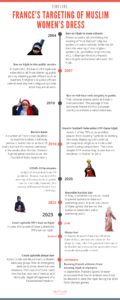Timeline: France’s targeting of Muslim women’s dress
Over the past two decades, the French government has passed a number of laws that have significantly impacted the rights of French Muslim women, namely their right to free expression and freedom of religion. Under the pretext of laïcité, France’s principle of secularism, the bans over the years have given the state the right to control and monitor Muslim women’s dress, a clear violation of basic human rights.
France’s focus on the hijab and Muslim women’s dress dates back to its colonial rule in the Middle East and North Africa. During its colonization of Muslim-majority countries, France sought to control the various populations and viewed the wearing of a hijab as a marker of potential resistance. During its colonization of Algeria, it carried out public unveiling ceremonies where Muslim women (often pressured by French officials) “removed their haiks (traditional wraps worn by North African women) or had them removed by European women, before throwing them to the ground or burning them.” These were all framed as “liberating” Muslim women, an argument still used by some French officials and commentators today who view the wearing of the hijab as a sign of oppression. Such a view is misguided and relies on age-old anti-Muslim tropes that view Muslim women as oppressed and in need of saving.
In the 21st century, the state has argued that the various bans on Muslim women’s dress are in line with the need to observe laïcité in public, despite scholarly research demonstrating that the argument of secularism has been used to carve out an exclusive French identity that is “infused with Catholic culture.” Over the past two decades, the government has instituted discriminatory measures under the pretext of laïcité to explicitly target French Muslim communities.The government has publicly acknowledged that such restrictions are being enacted in defense of “French values,” a vague term that lacks any clear definition, and is needed to curb what it describes as “separatism” within the French Muslim community. The support for these discriminatory measures comes from all sides of the political spectrum demonstrating just how mainstream Islamophobia has become in the Republic.
Gendered Islamophobia at the hands of the French government has included a number of laws and policies. Below is a timeline of numerous discriminatory anti-Muslim measures taken by the French government over the past two decades.


 Search
Search